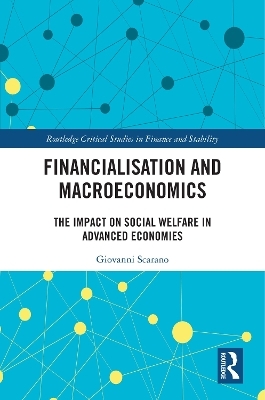
Financialization and Macroeconomics
The Impact on Social Welfare in Advanced Economies
Seiten
2022
Routledge (Verlag)
978-1-032-12132-1 (ISBN)
Routledge (Verlag)
978-1-032-12132-1 (ISBN)
Financialisation has become a widely discussed and debated term leading to a plurality of perspectives, but no fixed definition or single reading. This book presents a critical exploration and review of the current literature on financialisation and possible implications for the macroeconomic and financial stability of advanced countries.
Financialisation has become a widely discussed and debated term leading to a plurality of perspectives, but no fixed definition or single reading. This book presents a critical exploration and review of the current literature on financialisation, focusing on the financialisation of NFCs and its possible implications for the macroeconomic and financial stability of advanced countries.
Starting from this critical analysis, it proposes some new readings of the process of financialisation, linking it directly, on the one hand, to the evolution of interest-bearing capital and the credit system, and, on the other hand, to the historical tendencies of monopoly capital towards financial arrangements to manage corporate control. Finally, a conceptual scheme for interpretation and a mathematical model of corporate portfolio choice is developed to explain how the tendency in developed countries to place growing shares of social surplus in speculative financial channels can contribute to their long-term real stagnation. The book also underlines the excessive attention usually being paid to some micro-epiphenomena that show a fallacy of composition at the macroeconomic level and can lead to some misunderstandings of the general trends in capitalist evolution. Moreover, some doubts are raised about the extent to which financialisation actually represents a change to the present regime of accumulation.
The book targets all the scholars who are interested in better understanding whether financialisation constitutes a profound change in the functioning of capitalist economic systems and what effects it can produce in social welfare in the advanced countries.
Financialisation has become a widely discussed and debated term leading to a plurality of perspectives, but no fixed definition or single reading. This book presents a critical exploration and review of the current literature on financialisation, focusing on the financialisation of NFCs and its possible implications for the macroeconomic and financial stability of advanced countries.
Starting from this critical analysis, it proposes some new readings of the process of financialisation, linking it directly, on the one hand, to the evolution of interest-bearing capital and the credit system, and, on the other hand, to the historical tendencies of monopoly capital towards financial arrangements to manage corporate control. Finally, a conceptual scheme for interpretation and a mathematical model of corporate portfolio choice is developed to explain how the tendency in developed countries to place growing shares of social surplus in speculative financial channels can contribute to their long-term real stagnation. The book also underlines the excessive attention usually being paid to some micro-epiphenomena that show a fallacy of composition at the macroeconomic level and can lead to some misunderstandings of the general trends in capitalist evolution. Moreover, some doubts are raised about the extent to which financialisation actually represents a change to the present regime of accumulation.
The book targets all the scholars who are interested in better understanding whether financialisation constitutes a profound change in the functioning of capitalist economic systems and what effects it can produce in social welfare in the advanced countries.
Giovanni Scarano is Professor of Economics at Roma Tre University and a member of STOREP (Italian Association for the History of Political Economy).
Introduction. 1.Post-Keynesian approaches. 2.The French Regulation School and the Social Structures of Accumulation approach. 3.Classical Marxist approaches. 4.Interest bearing capital vs industrial capital. 5.Financial rentiers and the revenant conflict between rent and profit. 6.Corporate saving glut and liquidity holding. 7.Financialisation of NFCs, globalisation and growth. 8.Conclusion
| Erscheinungsdatum | 16.12.2022 |
|---|---|
| Reihe/Serie | Routledge Critical Studies in Finance and Stability |
| Zusatzinfo | 1 Tables, black and white; 15 Line drawings, black and white; 15 Illustrations, black and white |
| Verlagsort | London |
| Sprache | englisch |
| Maße | 156 x 234 mm |
| Gewicht | 394 g |
| Themenwelt | Geschichte ► Teilgebiete der Geschichte ► Wirtschaftsgeschichte |
| Wirtschaft ► Allgemeines / Lexika | |
| Wirtschaft ► Volkswirtschaftslehre ► Makroökonomie | |
| Wirtschaft ► Volkswirtschaftslehre ► Wirtschaftspolitik | |
| ISBN-10 | 1-032-12132-7 / 1032121327 |
| ISBN-13 | 978-1-032-12132-1 / 9781032121321 |
| Zustand | Neuware |
| Informationen gemäß Produktsicherheitsverordnung (GPSR) | |
| Haben Sie eine Frage zum Produkt? |
Mehr entdecken
aus dem Bereich
aus dem Bereich
Macht und Herrschaft im Zarenreich
Buch | Hardcover (2024)
C.H.Beck (Verlag)
CHF 69,85
wie die USA und China um die technologische Vorherrschaft auf der …
Buch | Hardcover (2023)
Rowohlt (Verlag)
CHF 41,95


